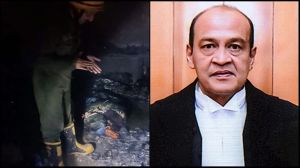Clean Bill
<i>A former manual scavenger,Usha Chaumar is now spreading the word about personal hygiene among rural Indian women.</i>
Dressed in a blue salwar kameez,an immaculately turned out Usha Chaumar walks into the room in her office in Delhi. She seems a little nervous,but is quick to make pleasantries. She rues that the meeting could not take place in her home town Alwar,in Rajasthan where she would have loved to show us around. Such niceties are now second nature to Chaumar. She has just returned from Marseille,France after delivering an address at the World Water Summit,where she spoke extempore on the need to maintain menstrual hygiene. A few days ago,she shared the dais with the President of India,Pratibha Patil on the occasion of the Nirmal Gram Puraskar for total sanitation in villages. The prime minister of Sweden,the princes of Belgium and The Netherlands have called on her as have several ambassadors to congratulate her on the good work that she has been doing.
A decade ago,there was no scope for such pleasantries,or accolades,in her life. Her existence was defined by an occupation,which even after being declared illegal,continues to persist and paints one of the most unedifying pictures of 21st century life in this country: manual scavenging. I have known only this occupation for as long as I can remember. After marriage,I used to accompany my mother-in-law, says Chaumar,who was married at 10 and had never been to school. It was a routine that began at 5am when she and 100 other women would clean the fecal remains of 300 houses in Alwar town for a paltry sum of Rs 300 a month,with only brooms and pails. I had come to believe that this was our fate. I wanted to study,wanted to be just like everyone else,have a normal life,mingle with others and partake in the small pleasures, says Chaumar,36.
Her occupation,perpetuated through heredity,determined that she remained at the fringes of society. Nobody would mingle with them,and the outcasts had no place in civic life. None of the women had been to any school,or had hopes of sending their children to one. It was at this juncture that an intervention happened.
In 2002,Dr Bindeshwar Pathak,the founder of Sulabh International,a sanitation movement that has worked for community welfare in its 30-odd years of existence,was taking Rob Sullivan,a BBC correspondent from London,to Alwar for filming a sanitation project in the town. While driving through Alwar,Pathak came across Chaumar and a group of other women carrying out their chores. He stopped the car and called out to Chaumar,the first woman he could spot.
He called out to me,and asked Why do you do this? says Chaumar. It was the first time that someone actually spoke to me,and I was quite stunned. Lifting my ghoonghat,I replied,This is what I have been doing and I know nothing else.
Pathak asked the group of women whether they would trade their current occupation for something better and for higher pay. He offered us Rs 1,500. It was too good to be true, says Chaumar.
Her initial reserve overcome,Chaumar and 28 others sought permission from their husbands and in-laws,and signed up with the organisation. Next,the group was brought to Delhi and given a warm welcome at the headquarters of the organisation,with a dinner at ITC Maurya Hotel8217;s famed Bukhara restaurant. It8217;s a memory Chaumar holds dear. Who could think that we would be welcomed with garlands? I did not exchange garlands with my husband at my wedding,for they were a taboo for our community. And as manual scavengers,we lived on leftovers. Even our pay was dropped from a height, says Chaumar.
Their initiation into the Nai Disha programme in Alwar transformed their lives. They were taught the art of grooming to tie their hair neatly,wear clean clothes and start the day with a prayer. That was the most significant change. Every day at 5am,when people would be praying,we would start the day cleaning someone elses refuse. But now,we could also pray like the others. Next,they were taught to read and write. I had always dreamt of going to school. Here,I was actually in one. It felt so good, says Chaumar. The inculcatation of a new set of activities formed part of their vocational training. The options available were pickle and papad making,sewing,embroidery,jute bag making and beautician courses.
Chaumar chose pickle and papad making,and today Nai Disha counts several hotels in Alwar and Delhi,including those belonging to the Taj group and Hyatt Regency among its customers. Her income too has gone up from the initial Rs 1,500 to Rs 2,700 and her efforts have seen the group expand to 115 members. By 2009,Alwar and the neighbouring district of Tonk were declared free of manual scavenging. People there started building toilets in their homes, says Chaumar.
The women,who had started a new innings,had another moment of glory awaiting them. The UN Mission Sanitation summit in New York in 2007 invited Chaumar and others to walk the ramp with top Indian models wearing their embroidered creations. It felt good, says Chaumar,thrilled by where life had taken her.
The same year,Chaumar was crowned the president of Sulabh International Social Service Organisation. In her present capacity,she shuttles between her daily work in Alwar and attending to her official duties in Delhi. The fame apart,Chaumars moment of social acceptance came when she and her associates were given entry to Alwars Jagannath temple. All that we could do was stand outside and pray. Now,we are free to enter the temple and make offerings like everybody else. I was overwhelmed when the head priest who let us in after a five hour wait,subsequently invited me for his childrens weddings. Could I ever have imagined that?, she says.
Her latest agenda is to spread awareness about menstrual hygiene among women. When I was a manual scavenger,I used to fall ill almost all the time. No one told me it was due to poor hygiene. Now,having seen the positive transformation on my health,cleanliness and hygiene are my priority, says Chaumar,who has started a facility to make sanitary napkins at Nai Disha. Today,10 years later,as she looks at the artefacts on display at Sulabhs World Toilet Museum in Delhi,she is glad that for her it is finally a station in life that is best viewed as a museum exhibit.
- 01
- 02
- 03
- 04
- 05































